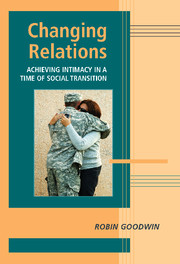Book contents
- Frontmatter
- Contents
- Foreword by Daniel Perlman
- Acknowledgements
- 1 The Nature of Social Change
- 2 The Myth of Modernisation?
- 3 More Beautiful than a Monkey: The Achievement of Intimacy
- 4 Friends and Social Networks
- 5 Sex and the Modern City
- 6 Marriage and the Family
- 7 Modelling Social Change and Relationships
- References
- Index
- OTHER BOOKS IN THE SERIES
7 - Modelling Social Change and Relationships
Published online by Cambridge University Press: 21 October 2009
- Frontmatter
- Contents
- Foreword by Daniel Perlman
- Acknowledgements
- 1 The Nature of Social Change
- 2 The Myth of Modernisation?
- 3 More Beautiful than a Monkey: The Achievement of Intimacy
- 4 Friends and Social Networks
- 5 Sex and the Modern City
- 6 Marriage and the Family
- 7 Modelling Social Change and Relationships
- References
- Index
- OTHER BOOKS IN THE SERIES
Summary
Social change is occurring at psychological, economic, and political levels in all societies, albeit at difference paces. In this book, I have argued that rapid changes have had direct impacts on the relationship lives of at least portions of the populace, but must be set against a backdrop of more gradual transitions that follow alongside any broader process of modernisation or economic development. Changes are often far from smooth and can be subject to considerable resistance. Families and wider social groups may be keen to retain traditions and norms, which may serve valuable functions in allowing individuals to adjust or may inhibit relationship equality or personal freedoms. Thus, the link between economic transformations and relationship behaviours and beliefs is invariably complex.
I have also argued that it is too simple to portray social change and its implications for close relationships as simply positive or negative. Change is likely to have differential impacts on different individuals, groups, and cultures. Economically independent and “structurally powerful” women and their male counterparts may now seek similar qualities in a mate. Individuals – and cultures – high on fatalism and distrust may be unwilling to provide the close friendships and support networks so psychologically important in times of civil unrest. Religious beliefs in a culture may serve to limit the availability of contraception and the practise of abortion and influence responses to sexual diseases such as HIV/AIDS. These moderating factors are rarely studied in the analysis of close relationships, but they are particularly significant when we consider more rapid social transitions.
- Type
- Chapter
- Information
- Changing RelationsAchieving Intimacy in a Time of Social Transition, pp. 176 - 186Publisher: Cambridge University PressPrint publication year: 2008



